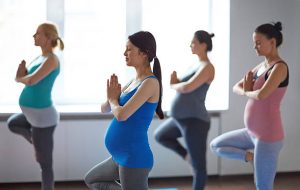Yoga Improves Pregnancy and Childbirth Outcomes
By John M. de Castro, Ph.D.
“Much like other types of childbirth-preparation classes, prenatal yoga is a multifaceted approach to exercise that encourages stretching, mental centering and focused breathing. Research suggests that prenatal yoga is safe and can have many benefits for pregnant women and their babies.” – Mayo Clinic
The period of pregnancy is a time of intense physiological and psychological change. The psychological health of pregnant women has consequences for fetal development, birthing, and consequently, child outcomes. Depression during pregnancy is associated with premature delivery and low birth weight. Childbirth fear is associated with “low childbirth self-efficacy, greater use of pain medication during labor, more unwanted obstetric interventions in labor, as well as increased risk of postpartum depression.” Hence, it is clear that there is a need for methods to treat childbirth fear, depression, and anxiety during pregnancy. Since the fetus can be negatively impacted by drugs, it would be preferable to find a treatment that did not require drugs. Yoga has been shown to relieve maternal anxiety and depression during pregnancy. So, it would make sense to study the effects of yoga during pregnancy.
In today’s Research News article “The effect of yoga on the delivery and neonatal outcomes in nulliparous pregnant women in Iran: a clinical trial study.” (See summary below or view the full text of the study at: https://www.ncbi.nlm.nih.gov/pmc/articles/PMC8091762/ ) Yekefallah and colleagues recruited women during their first pregnancy in their 26th-28th week and randomly assigned them to a no-treatment control condition or to receive 10 weeks of twice a week 75-minute Hatha yoga classes. They completed demographic information and body size and information was recorded about the pregnancy, childbirth, and neonatal outcome (Apgar score).
They found that the yoga group was significantly less likely to have labor induced, have a preterm delivery, had a significantly shorter labor duration, and had significantly lower episiotomy rupture grades. In addition, the children of the yoga group had significantly higher birthweights, were born at a later gestational age, and had significantly higher Apgar scores.
The results clearly demonstrate that yoga practice during a first pregnancy improves the pregnancy, delivery, and neonatal outcomes. It should be noted, however, that the comparison group did not receive any treatment. So, it is not clear if the benefits were due to practicing yoga or if they would have been produced by any gentle exercise. Nevertheless, the study found evidence that practicing yoga during pregnancy is of great benefit to the mother and the infant.
So, yoga improves pregnancy and childbirth outcomes.
“The combination of length and strength in the pelvic floor creates muscles with great integrity to support a baby in addition to all of the organs that rest on it. These strong muscles in conjunction with the gluteus medius are called upon during the second stage of labor (pushing) and are responsible for helping the bones of the pelvis come back together after delivery.“ – Karly Treacy
CMCS – Center for Mindfulness and Contemplative Studies
This and other Contemplative Studies posts are also available on Google+ https://plus.google.com/106784388191201299496/posts and on Twitter @MindfulResearch
Study Summary
Yekefallah, L., Namdar, P., Dehghankar, L., Golestaneh, F., Taheri, S., & Mohammadkhaniha, F. (2021). The effect of yoga on the delivery and neonatal outcomes in nulliparous pregnant women in Iran: a clinical trial study. BMC pregnancy and childbirth, 21(1), 351. https://doi.org/10.1186/s12884-021-03794-6
Abstract
Background
Yoga can reduce the risk of preterm delivery, cesarean section (CS), and fetal death. The aim of the present study was to investigate the effects of Yoga on pregnancy, delivery, and neonatal outcomes.
Methods
This was a clinical trial study and using the random sampling without replacement 70 pregnant women entered Hatha Yoga and control groups according to the color of the ball they took from a bag containing two balls (blue or red). The data collection tool was a questionnaire pregnancy, delivery, and neonatal outcomes. The intervention in this study included pregnancy Hatha Yoga exercises that first session of pregnancy Yoga started from the 26th week and samples attended the last session in the 37th week. They exercised Yoga twice a week (each session lasting 75 min) in a Yoga specialized sports club. The control group received the routine prenatal care that all pregnant women receive.
Results
The results showed that yoga reduced the induction of labor, the episiotomy rupture, duration of labor, also had a significant effect on normal birth weight and delivery at the appropriate gestational age. There were significant differences between the first and second Apgar scores of the infants.
Conclusion
The results of the present study showed that Yoga can improve the outcomes of pregnancy and childbirth. They can be used as part of the care protocol along with childbirth preparation classes to reduce the complications of pregnancy and childbirth.
https://www.ncbi.nlm.nih.gov/pmc/articles/PMC8091762/
